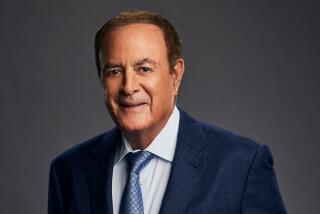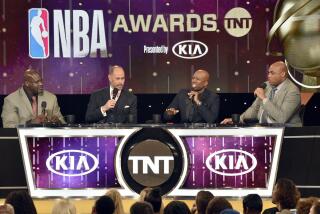Ice Cube’s Big3 shoots for basketball-hungry TV viewers on Fox
It’s just over two months since the Golden State Warriors won the NBA Finals, but for fans who can’t get enough, another professional hoops title will be decided Friday in New York.
Power and 3’s Company will compete at the Barclays Center in Brooklyn for the Big3 Basketball championship, where teams made up mostly of retired NBA stars battle in a three-on-three game on a half court. With its marquee event airing in prime time on Fox, the 2-year-old league is gaining in popularity and could be a harbinger of the future for TV sports.
The TV rights for major properties such as NFL football, Major League Baseball, NCAA men’s basketball and the NBA are tied up for years. But the demand for live sports from other fledgling leagues is increasing on both legacy TV outlets and emerging video platforms, presenting an opportunity for new ventures such as Big3. The league drew 760,000 viewers Friday on Fox for its playoff games, according to Nielsen, more than five times the number that watched last year on Fox Sports 1.
Fox has been nurturing the Big3 for good reason. The network will become more dependent on live sports after parent company 21st Century Fox completes the sale of its movie and TV production studios to Walt Disney Co.
The appeal of live sports, along with the proliferation of streaming video outlets, is drawing newcomers — such as rapper and actor Ice Cube who co-founded the Big3 — to a business for which the barrier to entry has traditionally been high.
Next spring, a new football league — the Alliance of American Football — will launch with a slate of games on CBS and the CBS Sports Network. The venture is headed by Charlie Ebersol, TV producer and son of longtime NBC sports executive Dick Ebersol, who sits on the league’s board. But even a media business novice such as LaVar Ball, father of Lakers star Lonzo Ball, was able to get a streaming video deal for the games of his start-up Junior Basketball Assn. on Facebook Live.
“If an entrepreneur can come up with a lean, mean operation — that’s appealing from a sports standpoint — there are a lot of different ways to get them on the air,” said Lee Berke, a sports media consultant who advises teams and leagues.
The concept for the Big3 league came to Cube after he watched Kobe Bryant score 60 points in his final game for the Lakers in April 2016.
The dazzling farewell performance led Cube to conclude there could be an audience for former stars in a format familiar to anyone who has competed on a playground. He also saw how the intense interest in the NBA had gone year-round, with news about free agency and the draft filling sports talk shows and websites as soon as the playoffs ended.
“There are people who have a basketball hangover after the finals,” Cube said in a recent interview. “I knew there were people who hibernated between the finals and the start of the NFL regular season. I knew that there was a void in the industry and we can fill it.”
Cube and his manager and business partner Jeff Kwatinetz, the league’s co-founder, signed up a respectable roster of NBA stars and enlisted league legends including Rick Barry and Julius Erving as coaches. They hired Todd Radom, a graphic designer with sports league experience, to help create team logos and uniforms that would pop on the TV screen. They tweaked the rules of three-on-three, adding a four-point shot from 30 feet out.
But nothing in the TV business is a slam-dunk.
When Cube and Kwatinetz first pitched Big3, every major TV network with the exception of ESPN met with them. All of them passed, they said. Kwatinetz said one executive said his company could simply buy the league if it became successful in a few years.
Eventually, Fox came back with an offer to televise the Big3 in a deal in which the league would get a share of TV ad revenue for the games (financial terms were not disclosed). But the network approached the new sport cautiously, presenting its first season on tape delay over the Fox Sports 1 cable network.
“With a new product not being tested and not knowing how long the games would take and the quality of the games, we wanted to make sure all of our ducks were in a row,” said Bill Wanger, executive vice president of programming, research and content strategy for Fox Sports. “We put it on tape, did some editing and as the season progressed, we felt good about it.”
Kwatinetz and Cube were skeptical of the tape-delay idea at first. But on the recommendation of Fox executives, they watched ESPN’s “30 for 30” documentary about the XFL, WWE founder Vince McMahon’s ill-fated football league that lasted for one season in 2001 despite having a TV deal with NBC. Kwatinetz said the lesson from the film was “things can go wrong.” (An undeterred McMahon recently announced plans to bring the XFL back in 2020.)
In season two, Big3 has aired three games a week on TV live and has added more high-profile retired stars, including Nate Robinson, Amar’e Stoudemire and Metta World Peace. The league also added a compelling story line by recruiting women’s basketball legend Nancy Lieberman as a head coach. She led her team, Power, to the best regular-season record, and now has a shot at history if she becomes the first female coach to lead a professional men’s team to a title.
“When we asked her, does she want the job?, her first question to me was, ‘Why do you want me?’” Cube recalled. Lieberman feared it was a stunt. “I’m like, ‘I wouldn’t suggest this if I didn’t think you would come here and try to win the championship,’” he said.
TV viewership for Big3 across Fox and Fox Sports has averaged 395,000 viewers, up 107% over 2017. Having all live broadcasts and added exposure on Fox’s broadcast network has helped. (Big3 has also shown one game a week on Facebook Live.)
The median age of the Big3 TV audience is 44, younger than that of every major league and collegiate sport except for the NBA (42) and Major League Soccer (40), according to Nielsen data.
The league’s eight teams are all owned by the Big3, and play a full schedule of four games in a different NBA arena each week during the regular season. Average attendance for the games is 13,484, up 25% over the first season. In April, Adidas signed on as an apparel sponsor and merchandiser.
Big3 is also getting more attention from sports journalism outlets, thanks to the celebrity of Cube. He has traveled to each city where the Big3 teams have played, giving interviews and filling venues with his famous friends, whose presence give the events the atmosphere of a big-time boxing match.
NBA players are clearly intrigued by the opportunity the Big3 offers them down the road. Kwatinetz said more than 100 have shown up at arenas around the country to watch the league.
There have been some bumps in the road. Big3 owners are suing a Qatari investment group, alleging that it failed to pay its agreed price for a piece of the league while trying to wrest control of it. The group, called Sports Trinity, pledged to invest $11.5 million for as much as a 15% stake with $9 million more in sponsorship money over three years, according to the lawsuit filed in April. Only $7.5 million was paid by the group, which includes a former Qatari diplomat in the U.S., Ahmed Al-Rumaihi, according to court documents.
Big3 is also a defendant in a suit from another basketball start-up, Champions League, which alleges Cube and Kwatinetz poached its players and ideas for their league.
Kwatinetz did not comment on the litigation, except to say it does not pose a threat to the league’s operation going forward.
The Big3’s short-term prosperity is tied to its next TV deal. Fox is in an exclusive window to negotiate the rights for Big3’s third season. “It’s been a great relationship,” Kwatinetz said. “Their production team has helped develop the look of our game.”
Long term, Cube said, the league also has global aspirations, looking to launch in other basketball-obsessed countries. (Three-on-three basketball will be an Olympics event starting with the 2020 Games in Tokyo.)
Although Big3 is clearly benefiting from the afterglow of the NBA’s current hot streak, TV sports executives and experts say it will take a few years to determine whether the league can become an enduring fixture with fans.
Patrick Rishe, director of the sports business program at Washington University in St. Louis, believes the television appeal of Big3 could be limited once the novelty of seeing retired NBA stars back on the court wears off.
“I can see them selling out arenas,” Rishe said. “I don’t think it’s something a network is going to be able rely on for increasingly larger numbers. People in general are more interested in the kids playing in the NBA summer league than what’s going on with guys who are passed their prime and no longer as relevant because their NBA careers are over. Whether it’s the NFL or the NBA, fans are most interested in what their team is going to be next year.”
Cube believes the connoisseur basketball fan appreciates the experience of the older players and coaches. He has also made it clear he would love to see Kobe Bryant in a Big3 uniform. But if Bryant ever does suit up, don’t look for another 60-point performance.
In Big3 Basketball, the winning team is the first to score 50.
Twitter: @SteveBattaglio
More to Read
Inside the business of entertainment
The Wide Shot brings you news, analysis and insights on everything from streaming wars to production — and what it all means for the future.
You may occasionally receive promotional content from the Los Angeles Times.











